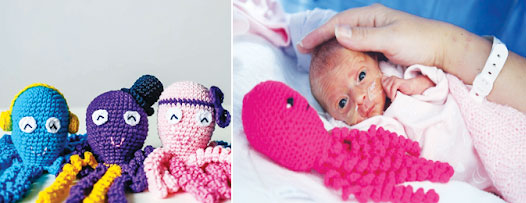By Dr. Amitava SenGupta Fellowship Neonatology (Neth), FNNF, MICP, DCH
Octopus Mother Care (OMC) [Click here for full article]
This most innovative Idea originated at Aarhus University Hospital in Denmark. The initiative appeared in Denmark in 2003 in the context of the Danish OCTO Project in Denmark, there is an actual community—known as spruttegruppen—that is dedicated to crocheting
octopuses for hospitals. (Reference - The Octo Project, Spruttegruppen, Denmark is available at
https://www.spruttegruppen.dk/danish-octo-project-english/, (2013)

Octopus therapy, also known as octo-therapy or octo-hugging is a practice in which small crocheted or knitted octopuses are placed along-side preemies as their bed-fellows in incubators or infant warmer beds while in neonatal intensive care units (NICUs).
As per recommendations, these octopuses have to be knitted in 100 percent cotton yarn material which can withstand the high temperatures used in autoclaving processes. The length of each tentacle at full stretch should not be more than 22 centimetres in order to prevent the chances of chocking.
This form of therapy is also popular in Finland and other parts of Scandinavia and St. Petersburg State Paediatric Medical University, Russia. It has caught up in other parts of Europe and United Kingdom too.
In the year 2018, while I was visiting St. Petersburg State Paediatric Medical University with my DSC Foundation Team to conduct an international workshop on “Developmentally Supportive Care (DSC) & Neuroprotection in NICU”, we had the opportunity to see and study this practice at length in the neonatal unit of the university hospital.
Since then, we have been sensitizing neonatal caregivers and pioneering the introduction of this unique neuroprotective strategy for preemies in neonatal units of India. The study, research and application of innovative practices of octopus therapy in India was initiated by the DSC Foundation at our neonatal unit of Paras Hospitals, Gurgaon and has been ongoing since then.
Octopus Therapy makes preemies feel safe and helps them thrive.
This special form of therapy helps the infant in maintaining a “Well organized State” with good “Self-regulation” and sleep states.
We, at the DSC foundation believe in incorporating evidence-based innovations in our research work and as a part of this process added a new dimension to the method of delivering octopus’ therapy. This involved “partnering with families” by simulation of KMC for the octopus with the mother.
In case of impending preterm deliveries, we have a practice protocol in our unit for antenatal counselling of the mother and family regarding octopus’ therapy and its benefits.
Initially, the octopus is put in direct contact with the mother’s skin on chest in a manner similar to KMC for a period of about 10 to 12 hours. During this process, maternal body odour is transferred on to the octopus.
After completion of this octopus mother care (OMC) session, the octopus is placed next to the infant in an optimal position as desired.
When the infant is lying next to the octopus, there is a positive stimulation of the Chemosensory system as the infant recognizes the familiar maternal smell. The constant stimulation of the Chemosensory system also helps in enhancing its maturation.
The mother may provide OMC to the octopus separately or along with the infant and these sessions should total to an optimal period of approximately 6 to 8 hours in a day.
OMC for the octopus by mothers of our preemie babies is a regular practice in our unit at Paras Hospitals which is the core centre of DSC Foundation.
Interestingly, the term “Octopus Mother Care” (OMC) happened to originate and was coined during the process of study, research and applications of this strategy in preemies at DSC Foundation-India.
The logical theory explaining the induction of this new term in the study of DSC, was that the octopus receives mother care through simulation of KMC and consequently has significant maternal scent/smell transferred to its body surface.
When subsequently being placed close to the infant, the octopus carrying this maternal scent plays a mother’s role for the preemie, by letting the baby sense the familiar maternal smell and also remember the in-utero experience of holding the umbilical cord while grasping the tentacles of the octopus. As mentioned earlier in the chapter this entire experience gives the baby a feeling of being safe and comforted by the mother.
Hence, this entire process and unique combination of the octopus initially receiving mother care and then delivering a sensation of maternal presence simulating mother care to the preemie culminates into a remarkable phenomenon, which we finally termed as “Octopus Mother Care (OMC)”.
This original and new terminology coined by us at the DSC Foundation has been trade-marked and is now for standard usage in the study and application of DSC science and practices.
PARAS HOSPITAL C-1 Sushant Lok- 1, Sector-43, Phase- I, Gurgaon, Haryana 122002 Timings Monday-Saturday : 12:30 pm - 05:00 pm
CHILDREN'S MEDICARE Villa No. 6, Ardee city Gate no. 1, (next to Ardee Mall), Sector 52, Gurugram, Haryana 122003 Timings Monday-Saturday : 5:30 pm - 8:30 pm